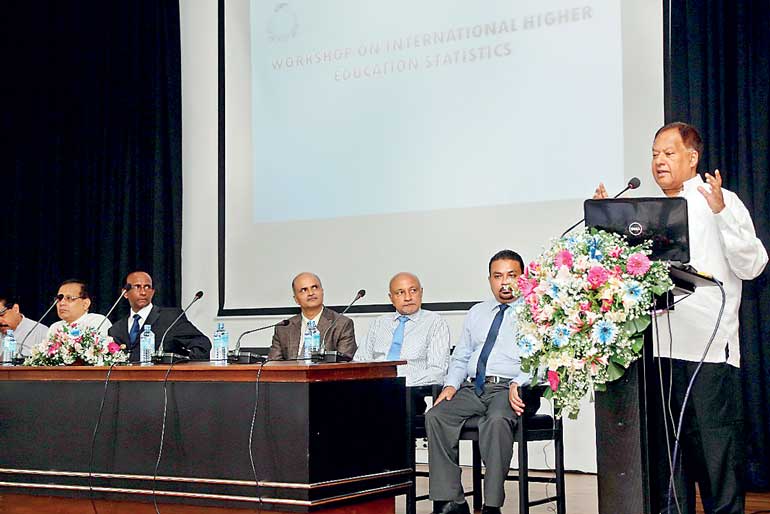Thursday Feb 26, 2026
Thursday Feb 26, 2026
Friday, 29 May 2015 00:00 - - {{hitsCtrl.values.hits}}

Minister of Higher Education and Research Dr. Sarath Amunugama was the chief guest at the workshop on international higher education statistics held on 25 May at the University Grants Commission Conference Hall. Above Minister Dr. Amunugama addresses the event. Secretary to the Ministry P. Ranepura, UGC Chairman Professor Mohan De Silva and UNESCO Institute for Statistic Statistical Advisor for South Asia Shailendra Sigdel were also present
Sri Lanka needs a lot of analysis regarding the future of higher education. It is essential to have a useful, proper and relevant data system for the university system to have an international level in higher education, administration and planning, Minister Dr. Amunugama said at the Workshop on International Higher Education statistics at the Auditorium, UGC on 25 May.
He further stated, “As the Ministry of Higher Education and the UGC, we must have strong links with UNESCO to make use of good opportunities that UNESCO offers. This is the widest sector when it comes to working out plans and programs of the Ministry and the UGC. Unless we have hard data today, it is very difficult to plan out. For a long time in Sri Lanka, not only our ministry but most ministries made their decisions out of individual perceptions, individual experience irrespectively in ministry levels, department levels, secretary levels and various levels.
“Experiences are also important but today sense is very complex; we cannot think of a future based on impressionistic data and impressionistic qualities. Large amounts of money can be wasted and more than that the future of thousands of young people of this country is at risk. So those who are managing this and trying to formulate the plans of the future have a responsibility to base their decisions on comparable data, on hard data, on defensible data.
“Since you are basically the officials concerned with data gathering in our university system, it is very important meeting and on the conclusion of this meeting we will be able to launch a new vision of the future. In the first phase we have to integrate. Now the different units of 17 universities and the various affiliated institutes, Central Bank, Ministry of Policy Planning; all involving data gathering, data analysis, data disseminating can integrate. That is the need of the hour.
“Already there is a lot of data in the Central Bank and a lot of data in the Ministry of Policy Planning. I believe that there is a lot of data in UNESCO both in the headquarters as well as the regional offices and also in the national offices. So the first task I would like to identify at your discussion is how to coordinate these different levels of data gathering and how not to duplicate. We need not try to reinvent the wheel. That is already there. There is a lot of material available and you can set up a small group here who can coordinate this material which is very easy accessible through their computers. These days you need not to go to offices and collect files etc.
“Today you can exchange information online. So I would like first propose to integrate that these going on in all these sectors. I’m sure that UNESCO will help us in expert advice and financially how to integrate. Secondly, I would like to propose on the general data such as breakdown of the financial year etc. As the chief of the COPE I have found that 20-30% of the allocation was not spent by universities. Though the Government says that the amount of allocation for the university system is high (such as 6% of the GDP), the university system has failed to utilise properly and systematically the money allocated. So the people are marching towards the ministry and UGC by protesting. This is the unfair situation.
“So we need to think of the importance of this. Secondly you need to identify the various responsibilities of the statistical crew. So identify and categorise the essential data. Thirdly we must be concerned not with data but relevant and useful data. Number four is your data must lead to policy making and actions. So that, relevant and useful data leads to policy making and actions. The other thing is public awareness. Most of the data you find is not accessible to the public. They don’t know what the data you found is and how you have made decisions. Most of the public perceptions are not based on adequate data; most are journalists’ feed, etc. In future if there is an issue, a march, we have to have a proper data disseminating method and on the basis of that we can speak out. That will be a statistical reply for that.
If we have such data, we can publish it. Then people can access the data, they can make use of it and even the university community can make use of that. And lastly we must have a comparative process like what we do for our figures and so on. The public in Sri Lanka doesn’t know what is happening in universities. If the data system is there, everyone can know and the transparency is there. So please consider on these matters and gather more hard data. If the hard data and published data are there, there is nothing to hide.